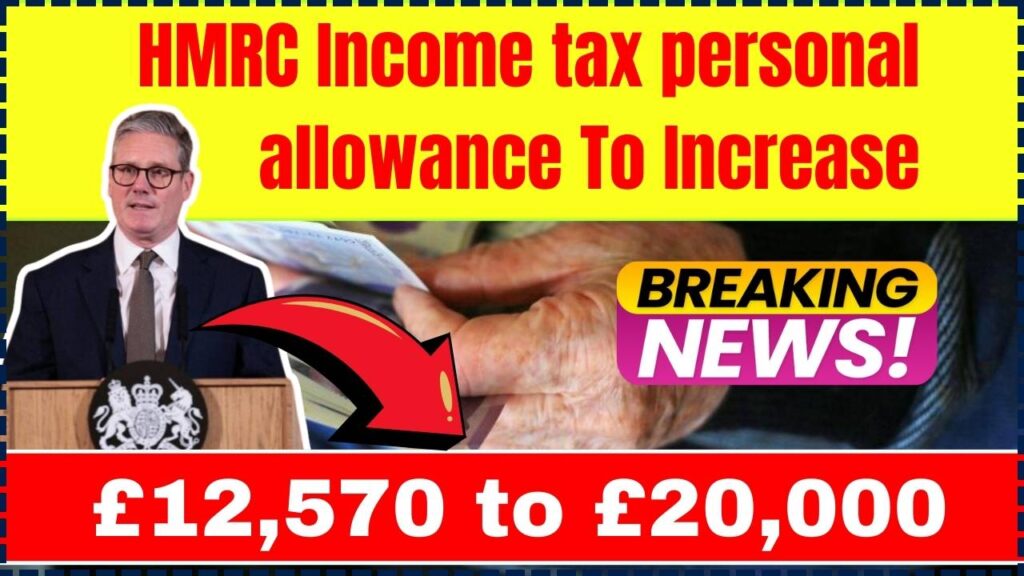
The HMRC Income Tax Personal Allowance plays a vital role in determining how much income you can earn tax-free each year. Recently, a petition calling for an increase from £12,570 to £20,000 has gained over 130,000 signatures, pushing it toward a potential debate in Parliament. This development could significantly impact millions of UK taxpayers, particularly low earners and pensioners, offering them financial relief during challenging economic times. This article explores the implications of this proposed change, its significance, and the potential next steps.
Income Tax Personal Allowance Could Increase from £12,570 to £20,000
| Topic | Details |
|---|---|
| Current Personal Allowance | £12,570 annually (frozen since 2021) |
| Proposed Increase | £20,000 annually |
| Petition Signatures | Over 133,915 as of February 2025 |
| Potential Impact | Benefit low earners, reduce reliance on benefits, support pensioners |
| Status | Petition under consideration for debate (source) |
The HMRC Income Tax Personal Allowance directly affects millions in the UK. The petition to raise the threshold from £12,570 to £20,000 could bring financial relief and economic growth but faces challenges related to fiscal policy. The outcome of this debate could reshape tax policy for years to come.
What is the HMRC Income Tax Personal Allowance?
The Income Tax Personal Allowance refers to the amount of income you can earn without paying tax. Set at £12,570 since April 2021, this threshold is expected to remain frozen until 2028, despite rising inflation and wages, leading to a phenomenon known as “fiscal drag.”
This freeze pushes more people into higher tax brackets over time. For those earning over £100,000, the allowance decreases by £1 for every £2 earned, vanishing completely at £125,140.
The Significance of the Petition
Initiated by Alan David Frost, the petition highlights the potential benefits of raising the threshold:
- Reducing reliance on government benefits for low-income earners.
- Ensuring pensioners have adequate, tax-free income.
- Encouraging economic growth through increased consumer spending.
This comes at a time when many face financial strain due to rising costs and inflation, making tax relief a pressing issue.
Context: Frozen Thresholds Amid Rising Costs
The decision to freeze the Personal Allowance until 2028 was made by the former Conservative government to stabilize public finances. However, critics argue that this approach ignores inflation and wage growth, burdening taxpayers over time.
According to the Office for Budget Responsibility (OBR), the freeze could add 3.2 million new taxpayers by 2028, with 2.6 million more entering higher tax brackets.
Impact on Low Earners and Pensioners
Increasing the allowance would provide essential relief. Low earners could retain more income, potentially reducing their reliance on benefits. Pensioners, many of whom live on fixed incomes, would avoid being taxed on their state pensions, improving their financial stability.
“Taxing pensioners on their State Pension is unfair,” Frost stated, emphasizing the need for change.
Potential Benefits of the Increase
1. Financial Relief for Low Earners
More take-home pay and less dependence on benefits.
2. Support for Pensioners
Ensures state pensions remain tax-free, aiding fixed-income households.
3. Boost to Economic Growth
Increased disposable income can enhance consumer spending and drive economic activity.
4. Simplified Tax Process
A higher threshold reduces the administrative load for taxpayers and HMRC.
Challenges and Opposition
Despite widespread support, the proposal faces hurdles:
- Fiscal Concerns: Reduced tax revenue could impact public services.
- Government View: Current policies aim to maintain fiscal stability, with officials stating, “Maintaining current thresholds supports public finances.”
Next Steps
With over 133,915 signatures, the petition qualifies for parliamentary debate. The government must respond, and MPs will deliberate the merits and potential challenges.
FAQs
What is the current HMRC Income Tax Personal Allowance?
It is £12,570, unchanged since 2021.
Why is the allowance frozen?
To support public finances until 2028.
Who started the petition?
Alan David Frost initiated it to propose an increase to £20,000.
How many signatures does it have?
Over 133,915 as of February 2025.
What happens next?
Parliament will debate the petition, and the government will issue a response.







